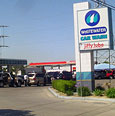Sale-leaseback Strategy Saves Sun As Mervyn's Folds
July 30, 2008
US private equity firm Sun Capital is keeping afloat on its investment in the bankrupt retailer, thanks largely to sale-leasebacks of several of the chain's department outlets. Sun Capital and Cerberus, which sold its stake last year, bought Mervyn's for $1.2bn in 2004.
California retail chain Mervyn's, acquired for $1.2 billion in 2004 by a Sun Capital Partners- and Cerberus Capital Management-led investor group, has filed for Chapter 11 bankruptcy.
The retail chain, which operates 177 department stores in the US concentrated primarily in California, said it needed to "reorganize its finances and operations" due to the economy and the "difficult operating environment." Mervyn's has been plagued with declining sales at its outlets in California and Arizona due to the flagging housing markets and a broader economic downturn challenging consumer confidence.
But Florida-headquartered turnaround specialist Sun Capital is not likely to suffer a serious financial setback, owing to the structure of its acquisition of the San Francisco-based retailer.
The acquisition of Mervyn's involved two separate deals for the retail business and its real estate assets. Stores were subsequently leased to Mervyn's and sold and leased to other retailers. Sun Capital is likely to break even on its investment, according to a Wall Street Journal report.
Sun Capital did not return calls for comment by press time.
Sun Capital and Cerberus, along with investors including Lubert-Adler and Klaff Partners, acquired the retail chain from Target Corporation in 2004 in a $1.2 billion transaction, capitalized with approximately $400 million in equity. Cerberus sold its stake in the retailer late last year.
Sale-leaseback strategies are being increasingly employed as firms seek to redeploy capital in the current market environment.
In March, New Jersey-based Sovereign Investment Company completed a $69 million sale-leaseback deal for 32 Lone Star Steakhouse & Saloons restaurant outlets. The deal enabled private equity firm Lone Star Funds to recapitalize its investment in the chain.
Jeff Hoppen, Sovereign chief investment officer, told PERE magazine earlier this year that private equity firms were now factoring in sale-leasebacks even before considering a deal, rather than much later down the line.
"In today's market it's even more of a tool," he said. Sale-leasebacks are often the biggest part of the financial package for a deal, he added. "It is a consistent source of capital. It's the financial choice du jour."
Along with its filing, Mervyn's said it had received a commitment for $465 million from a lender group led by Wachovia Capital Finance Corp., which will be combined with operating cash flow to fund its continuing operations.








